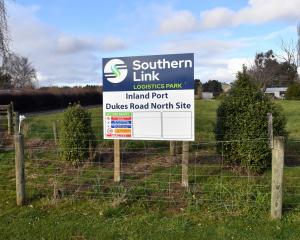
Environment Minister David Parker last week awarded $200,000 from the contaminated sites remediation fund for a feasibility assessment and remedial action plan for the tar well area of the former Dunedin Gasworks site in Hillside Rd.
"A robust remediation plan will help ensure hazardous waste can be removed and the health of the community protected," Mr Parker said.
The 1,400,000-litre tar well is a leftover from the former city-owned Dunedin Gasworks, which operated from 1863 to 1987.
The well contains potentially cancer-causing chemicals and other toxic waste.
The DCC has $2.64 million in its 10-year plan for remediation of the site.
The bulk of the money ($2.1 million) is due to be spent in 2023-24 and the rest is earmarked for the following year.
The council has not yet decided its preferred remediation option.
Every year, the council has $100,000 in its budgets to cover the cost of removing contaminated water, site testing and any associated maintenance.
Management of the site includes pumping out contaminated rainwater and taking it to Christchurch for disposal.
In 2017, the council, via the Otago Regional Council, received about $20,000 from the same fund for costs associated with a feasibility study for site options.
A DCC spokesman last week said the council was not in a position to discuss the minister’s funding announcement, but would
say more in due course.
ORC compliance manager Tami Sargeant said although the regional council applied for the funding and was the funding recipient, the money would be available for use by the city council.
The project was due to be completed in February 2022.
In part because of the disruption of Covid-19, that had been delayed.
The ORC was working with the DCC and the Ministry for the Environment to update the project plan to determine a new delivery date, Ms Sargeant said.
A spokesman for Mr Parker said it was not unusual for a project to receive multiple rounds of support from the fund.
Funding could be sought for different phases of a project, including feasibility studies, action plans or remediation.
The tar well clean-up could qualify for another phase later, he said.
Also last week, the Northland Regional Council and Department of Conservation received $150,950 to investigate contamination of the Puhipuhi Mercury Mine site north of Whangarei.
The Southland Regional Council and Doc were granted $35,000 to complete an investigation of the landfill at the Little Tahiti site in Fiordland.
Comments
Another taxpayer funded environmental clean up!
This pollution was caused by the citizens and ratepayers of Dunedin. The citizens and ratepayers of Dunedin should be funding the cleanup.
Can you imagine the outcry if the people of Dunedin had to contribute to a similar cleanup in Auckland?
People in Dunedin should really start paying taxes too then, and stop leaving all that tax paying to Aucklanders!










